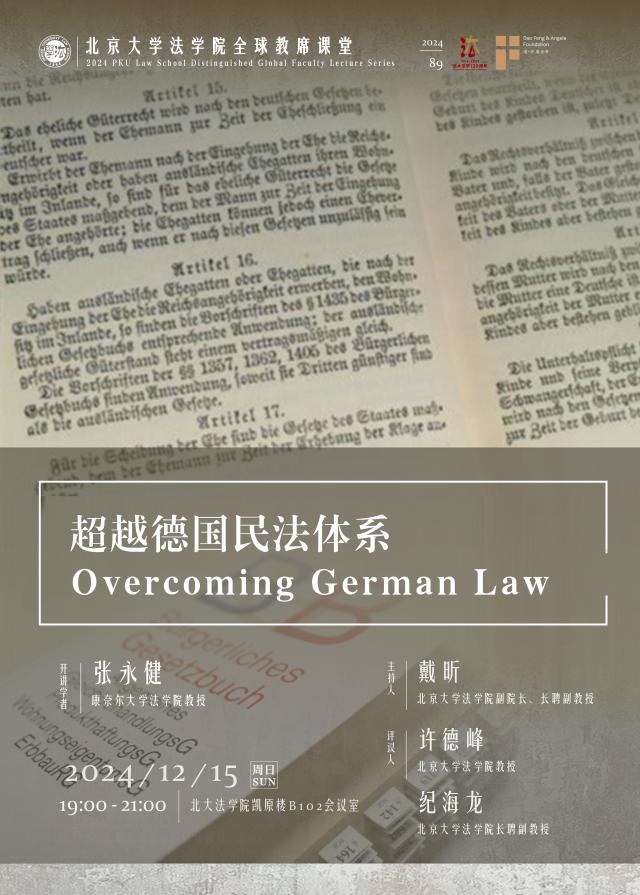You are here: Home»
External Relations»
Newsletter»
Yun-chien Chang, Overcoming German Law
Yun-chien Chang, Overcoming German Law
Date:2025-01-07
Yun-chien Chang, Overcoming German Law

This semester, Professor Yun-chien Chang, Professor of Cornell Law School and PKU Law Global Faculty Professor delivered two lectures.
On December 15, 2024, Chang lectured on "Overcoming German Law," a critical analysis of the current civil law theoretical framework imported from Germany. Professor Chang argued that the German system's complexity and internal contradictions render it unsuitable for the Chinese legal system. He proposed developing a new, indigenous civil law framework, suggesting Wesley Newcomb Hohfeld's analytical framework as a potential model.
【Speaker Profile】
Prof. Yun-chien Chang is Jack G. Clarke Professor in East Asian Law at Cornell Law School and also directs the Clarke Program in East Asian Law & Culture. He has served a visiting professor at New York University, the University of Chicago, St. Gallen University, Hebrew University of Jerusalem, Haifa University, and Rotterdam Institute of Law and Economics. He has also conducted research at Free University of Berlin, University of Paris II, and University of Tokyo. Prof. Chang is a co-editor of Journal of Empirical Legal Studies and an Associate Reporter on American Law Institute’s Restatement of the Law Fourth, Property. Prof. Chang is President of Asian Law and Economics Association and a director of the Society for Empirical Legal Studies.
His current academic interests focus on economic, empirical and comparative analysis of private law (particularly property law), as well as empirical studies of the judicial system. Prof. Chang has authored and co-authored more than 100 journal articles and book chapters. His English articles have appeared in leading journals around the world, such as Journal of Legal Studies; Journal of Legal Analysis; Journal of Law and Economics; American Law and Economics Review; Journal of Law, Economics, and Organization; Journal of Empirical Legal Studies; International Review of Law and Economics; European Journal of Law and Economics; I˙Con; the University of Chicago Law Review; Southern California Law Review; Notre Dame Law Review; Iowa Law Review and Supreme Court Economic Review, among others.
His monograph Private Property and Takings Compensation: Theoretical Framework and Empirical Analysis (Edward Elgar, 2013) was a winner of the Scholarly Monograph Award in the Humanities and Social Sciences. His second monograph Property Law: Comparative, Empirical, and Economic Analyses was published in June 2023 and will be widely reviewed. Prof. Chang (co-)edited Empirical Legal Analysis: Assessing the Performance of Legal Institutions (Routledge, 2014), Law and Economics of Possession (Cambridge University Press, 2015), Selection and Decision in Judicial Process Around the World: Empirical Inquires (Cambridge University Press, 2020), etc.
He authored several books in Chinese: Economic Analysis of Law: A Methodological Primer (Peking University Press, 2023), Compensation for Physical and Regulatory Takings of Land: Theory and Practice (Angle, 2013; 2nd edition, 2020), Economic Analysis of Property Law (Peking University Press, 2019), Empirical Legal Studies: Principles, Methods, and Applications (New Sharing, 2019; 2nd edition, 2022), Interpreting Private Law: A Social Scientific Approach (New Sharing, 2020), etc. He also (co-)edited The Empirical Legal Studies Reader I: Domestic Perspectives (The Law Press, 2020), The Empirical Legal Studies Reader II: International Perspectives (Contemporary China Publishing House, 2024 forthcoming), to name a few.
Prof. Chang sits on the editorial board of several leading journals, including Law and Social Inquiry (2024–2026), Journal of Law and Empirical Analysis (2024–), European Journal of Law and Economics (2019–), among others.
Prof. Chang’s academic achievements have won him the 2019 ALSA Distinguished Article Award, the Best Poster Prize at 2011 CELS, several research grants, among others.
Prof. Chang received his J.S.D. and LL.M. degrees from New York University School of Law, where he was also a Lederman/Milbank Law and Economics Fellow and a Research Associate at the Furman Center for Real Estate and Urban Policy, NYU.
For more information,please check out:
https://www.law.pku.edu.cn/xwzx/xwdt/68dfb0c2fd5b4273ac225d5c8cf5b8fd.htm
https://www.law.pku.edu.cn/xwzx/xwdt/68dfb0c2fd5b4273ac225d5c8cf5b8fd.htm



